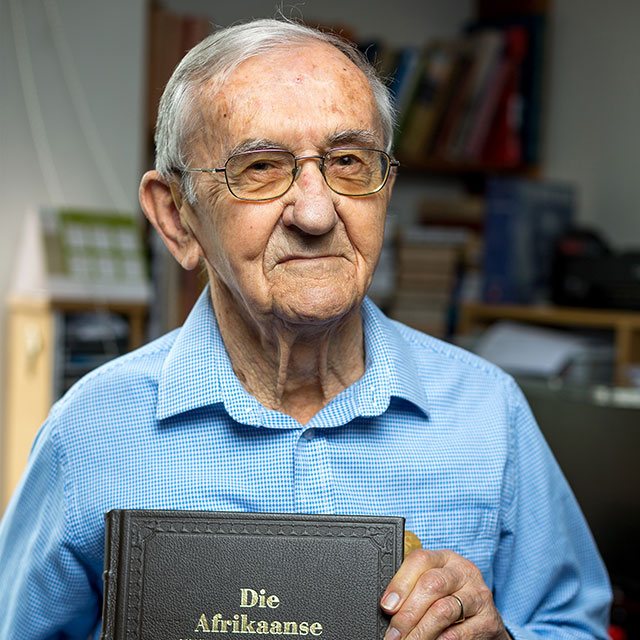
Jacob Petrus Coetsee is just five years younger than Stellenbosch University (SU). With almost a century to look back on, he has enough stories to fill several books. And he remembers his days as a Matie student like it was yesterday.
Jacob did his master’s degree in Afrikaans/Dutch at Stellenbosch, followed by an SED and MEd-I course.
He says, for example, that meals at Dagbreek men’s residence, where he lived with roommates Theo Pistorius in 1943 and Oloff Smit in 1944, were, according to him, not always something to write home about. “The food was terrible. We boycotted the food more than once: we’d pour everything standing on the table – salt, pepper, mustard, tomato sauce – into the dishes and onto the table, mix it all up so that it couldn’t be used again, walk out and go and eat at Suikerbossie.”
Student humour was clearly in abundance. The lecturer society’s annual dinner, also held in Dagbreek’s dining hall, was another example of this. During the course of the dinner in the dining hall, some of the sturdier students carried one lecturer’s small, lightweight car up the stairs, pushed it through the quad, carried it up more stairs and set it down in front of the closed doors of the dining hall. At a prearranged time, all Dagbreek’s lights were switched off and, when the guests opened the doors to the dining hall to investigate – there stood the car, its lights on bright. “The lecturer had to plead with the students to take his car outside again and to promise that he’d award everyone good marks for the next semester.”
Only one student in Dagbreek had a car in those days, bicycles being the general mode of transport back then. And, just like many other everyday things, the latter were also found to be a source of fun. One day, for example, the students got their hands on the bicycle belonging to the traffic constable known as Five Bob and hoisted it up Dagbreek’s flagpole. “I, too, had a bicycle, which I’d bought third-hand from Appie de Beer. His widow is, coincidentally, living in the same home for the elderly as I am,” says Jacob . Bicycle theft was a common occurrence even back then and Jacob’s bicycle also disappeared once. A month later, he saw his bicycle standing dustily at the station – someone just wanted to ‘borrow’ it.
After his studies, Jacob taught in Kirkwood for three and a half years. When he started to lose his hearing, he left teaching and went on to a specialist division at the then Department of Education, Arts and Science in Pretoria – the Language Service Bureau. There he did translation work, language guidance and editing, mainly in Afrikaans. “Seventeen years later, I came and did in Stellenbosch what I’d actually already wanted to do as a student – I became co-editor at the Woordeboek van die Afrikaanse Taal, the WAT.”
Jacob retired from the WAT in 1985; he has been a pensioner for 32 years now. With Part 14 of the dictionary in his hand, he says, “I’ll have you know that a lot of sweat went into this book.” According to Jacob , a Dutchman by the name of Joseph Scaliger wrote in 1597 that “if someone were to deserve the most severe punishment, do not throw him in prison or send him to the mines, no, let him write dictionaries, because in this one activity are compressed all possible torments of the human spirit”.
According to his daughter, Jacob is a positive person and he never stops learning. “He’s a walking encyclopaedia. When someone in the family doesn’t know something, we simply phone him.” Jacob dedicated his entire life to Afrikaans and it saddens him to see the way that Afrikaans is going. He does not think that the process cannot be reversed; it can, he says, be halted if everyone who cares for the language does her or his duty. His motto: “Be honest and treat your fellow human beings with respect”. A university is, to Jacob, an after-school institution where information, insights and skills are transferred to less knowledgeable persons. “Dedicate yourself to your studies and the rest is incidental.”
- By Elbie Els -